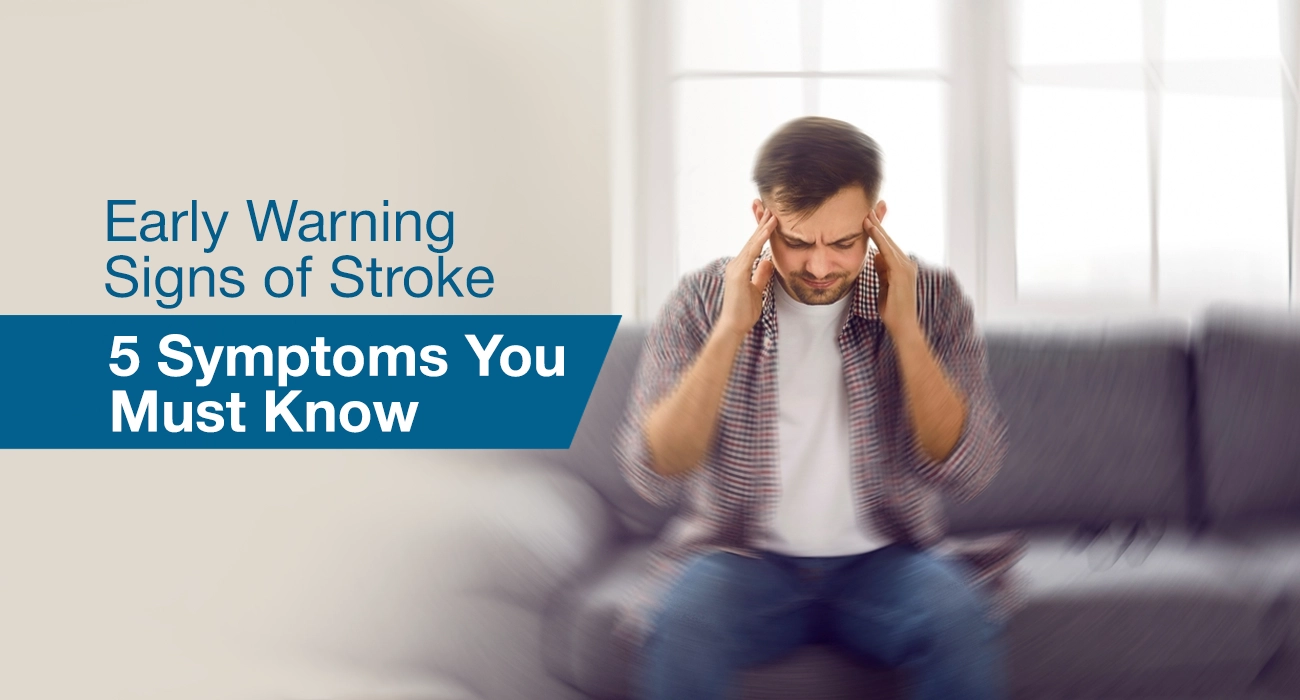Early Warning Signs of Stroke: 5 Symptoms You Must Know

Do not read this if you have no stress.
Your loved ones always remind you, “Please don’t take too much stress.” They aren’t just worrying for nothing; there’s a reason behind their concern. Studies show that about 1 in 6 strokes is associated with depression and stress.
When your mental well-being suffers, your likelihood of having a stroke or even a mini-stroke can nearly double, particularly as you grow older. Stress silently chips away at your health, and sometimes your body begins telling you the early warning signs of stroke or mini stroke before it’s too late. Knowing these signs could safeguard your life. Let’s understand the early warning symptoms you must never ignore.
But first, let's explore how poor mental health increases the chances of stroke.
Poor Mental Health & Stroke: What’s the Link?
Poor mental conditions, like constant stress and depression, can negatively impact your body in ways that escalate the risk of stroke (blood flow to a part of the brain is interrupted). When you are stressed, your body releases certain hormones that, if short-term, aren’t harmful.
However, if stress lasts for a longer period, these hormones can cause arteries and blood vessels to harden (also known as atherosclerosis), which is linked to stroke. Depression also causes high blood pressure (hypertension) and irregular heartbeat (atrial fibrillation).
Both mental conditions can disturb blood flow to your brain, but they often go undiagnosed, which further complicates the situation. Plus, depression can make your blood more likely to clot, adding to the chance of a stroke. Hence, taking care of mental health is crucial not just for your mind but also to help protect the heart and brain.
Also Read: Exploring The Brain Breakthroughs In Neurological Disorders And Treatments
What Are the Early Warning Signs of Stroke or Mini-Stroke?
A. Early Warning Signs of Stroke
The early warning signs of stroke may include:
- Experiencing weakness or numbness in your face, arm, or leg. These are usually only on one side.
- Having difficulty talking
- Unable to understand what others say
- Blurry vision or loss of sight in one or both eyes
- Feeling dizzy or unsteady
- Struggling to keep your balance
- Finding it hard to move or walk
- Suddenly fainting
- Having a seizure without warning
- Getting a sudden, severe headache with no clear cause
- Other less common signs to watch for are sudden nausea or vomiting without a reason. Briefly losing consciousness, feeling confused, having seizures, or slipping into a coma.
Also Read: Your Gut Health Matters: Signs You Should See a Gastroenterologist
B. Early Warning Signs of Mini-Stroke
A mini-stroke is also called a transient ischaemic attack (TIA). Think of it as like a warning stroke. It causes symptoms similar to a full stroke; however, they come on suddenly and then fade away within minutes to up to 24 hours. But the symptoms will not go away without medical help.
Since these symptoms are temporary, some individuals may brush them off, but it’s very crucial to take them seriously. A TIA is a red flag that a real stroke could happen soon, so if you or someone else notices any of these signs, seek medical help immediately. Getting timely medical attention from the (neurology) best neurologist in Jaipur can prevent a more serious stroke from happening.
Be aware of these signs of a mini-stroke:
- Weakness, numbness, or paralysis (the loss of the ability to move), often affecting one side of the face, arm, or leg
- Slurred speech
- Trouble understanding what others are saying
- Loss of vision in one or both eyes
- Experiencing double vision
- Feeling dizzy
- Having problems with balance and coordination
Note: Even short-lasting symptoms deserve urgent medical attention.
Conclusion: When to See a Healthcare Professional?
Here's a simple way to figure out when to see the best neurologist in sanganer Jaipur if you suspect a stroke. The acronym FAST stroke symptoms, which stands for Face, Arms, Speech, and Time, will help you spot common stroke signs fast:
- F - Face: One-sided facial drooping while smiling.
- A - Arms: When lifting both arms, one drifts downward, or there is weakness in one arm.
- S - Speech: Slurred speech or unable to understand others
- T - Time: If you notice any of these signs, call emergency services immediately because every minute matters.
But some strokes can have less noticeable symptoms. Researchers observed that only using F.A.S.T. can miss some stroke cases. That is why they have added B and E to make B.E. F.A.S.T. to help identify more strokes:
- B - Balance: Sudden trouble walking, dizziness, or loss of coordination.
- E - Eyes: Sudden blurred vision, double vision, or impairment/loss of sight in one or both eyes.
Acting quickly upon noticing these early signs of stroke or mini-stroke and immediately getting emergency help is the key.


 0141-3120000
0141-3120000